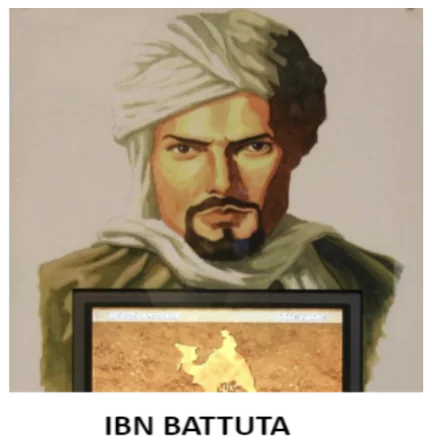Introduction
Ibn Battuta, born in Morocco, wrote the famous book “RIHLA” about his travels. He explored places like Syria, Persia, and even reached China. He worked for Sultan Muhammad bin Tughlaq in Delhi and journeyed across South Asia, sharing unique observations about the people and places he encountered.
1. About Ibn Battuta

- Birthplace: He was born in Tangier (Morocco).
- Ibn Battuta’s “RIHLA”: He is famous for his ‘book of travels’, RIHLA which offers insights into the subcontinent’s social and cultural life in the 14th century.
- The Value of Experiential Knowledge: Ibn Battuta valued experiential knowledge gained through travel over books.
- Ibn Battuta’s Travels: He travelled to Syria, Iraq, Persia, Yemen, Oman, and East African trading ports.
Enroll now for UPSC Online Course
2. Service in Delhi and Exploration of South Asia and Beyond
- Heading 1: Heading 1: Journey to the Subcontinent
- Heading 2: Ibn Battuta as the Qazi
- Heading 3: Diplomatic Mission to the Mongol Ruler
- Heading 4: From Malabar Coast to China
- From Central Asia to Delhi: Travelling through Central Asia, he reached Sind in 1333. Lured by Muhammad bin Tughlaq’s reputation as a patron of arts and letters, he set off for Delhi.
- Service in Delhi: Impressed by his scholarship, Muhammad bin Tughlaq appointed him as the qazi (judge) of Delhi and later sent him to China as the Sultan’s envoy to the Mongol ruler in 1342.
- Exploration of South Asia and Beyond: Ibn Battuta travelled through central India to the Malabar coast, the Maldives (stayed for 18 months as qazi), Sri Lanka, Bengal, Assam, and Sumatra before reaching the Chinese port town of Zaytun (Quanzhou).
- In China, he ventured as far as Beijing before deciding to return to Morocco in 1347 for which he is often compared to Marco Polo (Venice), who explored China and India in the late 13th century.
The coconut and the paan: Ibn Battuta’s Description
- Coconut and Paan were two unfamiliar plants to him. He described the betel (paan) as a tree cultivated similar to grapevines, primarily for its leaves.
|
3. About Cities
- DELHI: He provides a detailed description of Delhi, a city with Twenty-eight gates, Budaun Darwaza (largest), Mandwi Darwaza (grain markets inside) and Gul Darwaza (near an orchard).
- DAULATABAD (Maharashtra): He also provides a detailed description of Daulatabad which was similar in size to Delhi.
- Economic Hubs and Cultural Crossroads: Bazaars served not only as economic centers but also as hubs of social and cultural activities.
- Most bazaars had both a mosque and a temple, and some provided spaces for public performances by dancers, musicians, and singers.
- The Prosperity of Towns: Indian agriculture was highly productive (farmers cultivating two crops annually);
- The subcontinent was well-integrated into inter-Asian trade networks, with high demand for Indian textiles.
- The state provided inns and guesthouses along almost all trade routes.
- The postal system was very efficient (merchants could send information, remit credit across long distances and dispatch urgently needed goods).
- However, Slavery was prevalent. Slaves were openly sold in markets and regularly given as gifts.
Enroll now for UPSC Online Classes
Conclusion
In Ibn Battuta’s travels, he marveled at the diversity of cultures and the richness of trade in 14th-century South Asia. His detailed descriptions of cities like Delhi and Daulatabad provide valuable insights into the social, cultural, and economic life of the time. Despite challenges like slavery, his journey highlights the interconnectedness of the world even centuries ago.
